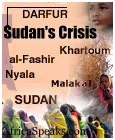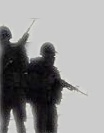 |






 AfricaSpeaks Weblog AfricaSpeaks Weblog
 Rootswomen Weblog Rootswomen Weblog
 Rootsie's Weblog Rootsie's Weblog
|
Hard to Make Case Against Iraq
Posted: Friday, August 9, 2002
Published on Friday, August 9, 2002 in the Seattle Post-Intelligencer
by Anthony B. Robinson
"Wars and rumors of wars" goes a phrase from a verse in the New Testament. These days we have both. But of late we seem to be hearing much more of the rumors of war --against Iraq -- than we do reports about the war on terrorism.
The nearly daily rumors of war against Iraq are deeply troubling. Let us acknowledge the obvious: Saddam Hussein is a malevolent force in the volatile Middle East, a leader who is guilty of heinous acts. But this seems a case where the old childhood adage applies. "Two wrongs don't make a right." In my book it remains wrong to invade a nation that has not attacked our country or our allies.
As the rumors mount and the drumbeat for war grows louder, there are a host of specific questions to be asked and answered. For openers, what really is the case against Saddam? That is, what do we know about his capacities and intentions? What real evidence is there that Saddam and his regime constitute an imminent threat to the American people or our allies?
We have heard the cryptic slogan-like accusations. "This is a man who has poisoned his own people." "He is secretly developing weapons of mass destruction." "He has violated U.N. mandates." But these are more slogans than a convincing or substantive case for a war that would not only put American lives at risk but that would further jeopardize the already sorely tested and traumatized people of Iraq.
Second, the administration has given no indication that it will seek a constitutionally required Declaration of War from Congress. The intent of such a requirement is, at least in part, that a convincing case be made for such a drastic course of action as invading another country or going to war. Yes, some elements of secrecy are lost in such open deliberations and proceedings. But I thought that was the point, that we do things differently here.
When we turn to the ethical tradition of the Christian faith, other important questions arise from the Augustinian doctrine of just war. This set of teachings attempts to describe the conditions that must be met if a Christian is to take part in what is always an unholy yet sometimes unavoidable military action.
I will not attempt here to consider each of the criteria that the just war tradition holds forth. But ponder this one. For a war to be considered "just," all other available means of resolving conflict have been tried and exhausted. A recent article in "The Christian Century" magazine cites the work of George Lopez and his colleagues at the University of Notre Dame. Lopez has outlined a three-part strategy to contain Saddam without military action.
"The first step is to revise U.N. sanctions to tighten controls on Iraq's oil revenues and military-related goods while easing restrictions on civilian economic activity. The second is to bring back U.N. weapons inspectors to complete the U.N. disarmament mandate and re-establish an Ongoing Monitoring and Verification system. Finally, in the event that Iraq refuses to allow weapons inspections, create a border monitoring and control system."
Beyond the questions of substantive and compelling evidence of an Iraqi threat, processes of deliberation in duly constituted bodies and exhausting other means to resolve a conflict, the largest looming question here is the matter of U.S. moral authority. If we do not hold ourselves to high moral standards there is nothing left but "might makes right," and that really does mean a world of fear and brutality for all.
Moral authority does not derive from bravado, nor is it grounded in the impulse toward revenge. Since Sept. 11 there has been some of both, but really surprisingly little. By and large, the American people have responded with decency and restraint. Still, one can understand and forgive a certain amount of bravado and appeal to emotion from the person on the street, but not from the person in the White House.
Moral authority does derive from a capacity for self-criticism, for honest self-examination. It derives from the ability to apply the values and judgments made of others to oneself. It derives from the capacity to discern the power of self-interest to warp and distort one's judgment and actions.
Two generations ago the great American theologian, Reinhold Niebuhr, wrote: "Moral pride is the pretension of finite man that his highly conditioned virtue is the final righteousness and that his very relative moral standards are absolute." In matters of war and rumors of war, one wants a leader who has doubts, who is not absolutely sure of himself. Having doubts does not mean being paralyzed into inaction. It means recognizing one's own capacity for self-deception.
The president has set a course for which he ought to remain resolute -- taking seriously the reality and threat of terrorism. But this course will be defensible only if the United States does not make of it a license for unilateral adventurism. Moreover, launching war on Iraq seems a sure way to recruit more to the terrorist cause.
An unprovoked U.S. invasion of Iraq may -- at its best, and there's no assurance of such an outcome at all -- provide a short-term solution. But this short-term solution will squander the moral authority that must be the basis of our long-term hope and leadership at this crucial and precarious moment in the world's history.
Anthony B. Robinson is senior minister at Plymouth Congregational Church: United Church of Christ in Seattle. E-mail: trobinson@plymouthchurchseattle.org
 Printer friendly version Printer friendly version
 Send page by E-Mail Send page by E-Mail
|








